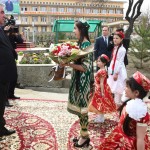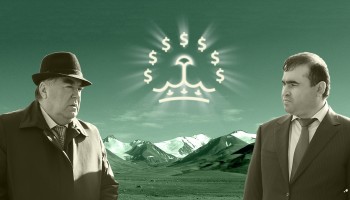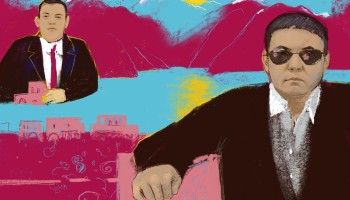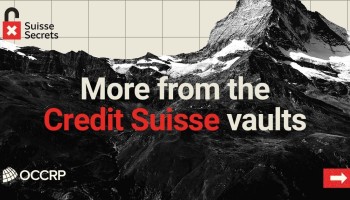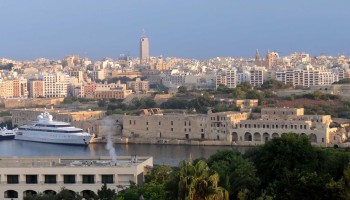Many countries are led by an authoritarian elite. But few are as dominated by a single ruling family as Tajikistan.
The Organized Crime and Corruption Reporting Project (OCCRP) has shown how anything of value in the country — from mining licenses to driving schools and even to medicinal plants — is quickly snapped up by President Emomali Rahmon and his relatives.
A regime defined by such brazen kleptocracy can survive only in the absence of organized opposition.
Ironically, Tajikistan — the least-developed of all the former Soviet republics — was once home to one of the region’s most unique and effective opposition parties. For years, the Islamic Renaissance Party of Tajikistan (IRPT) had represented a real (if unlikely) alternative to the Rahmon family’s rule.
The IRPT never held real political power. Tajikistan’s system, democratic only in name, was stacked too heavily against it. What the party did have was a countrywide activist infrastructure, real grassroots influence, and popular legitimacy. By the power of its own example, it showed that even here, a different kind of politics was possible.
Then — in just a matter of months — it was gone.
In the summer of 2015, using a combination of arrest, intimidation, and propaganda, President Rahmon’s regime swept the party away, inflicting massive human suffering. Its local supporters are cowed while its activists are either imprisoned or scattered across the world.
The story of the IRPT’s demise explains how a regime like Tajikistan’s can survive even as it grows wealthy at the expense of its own people. The day of reckoning seems further away than ever, and Tajikistan is still awaiting its Islamic renaissance.
Islamist Roots
The IRPT was never anything like the small, elite-based, and mostly powerless liberal opposition parties that arose in several other newly independent Soviet republics. Rather, the party’s origins lie in an decades-old underground Islamist movement that had sought to challenge Soviet dominance.
From the late 1920s, as in the other Central Asian republics, Moscow promoted rapid modernization in Tajikistan. Many thousands of people were forcibly resettled from the mountains to the plains of the southern Khatlon region, organized into collective farms, and directed to produce cotton on an industrial scale.
“It was among these displaced people ... that an underground Islamic movement emerged,” explains Edward Lemon, a Tajikistan specialist and researcher at Columbia University.
The IRPT’s roots lie in this milieu. The party’s founder, Said Abdulloh Nuri, was a committed Islamist hounded for much of his life by the KGB. As late as the 1980s, when Communist rule was at once crumbling and liberalizing, he was arrested and exiled to a Siberian prison colony.
But it wouldn’t be long before both he and the IRPT rose to national prominence.
The collapse of the Soviet Union was noteworthy for being largely peaceful — but Tajikistan was a bloody exception. Dueling protests for and against continued rule by Soviet-era elites soon spiraled into a ruinous civil war that raged from 1992-1997, leaving tens of thousands of people dead and perhaps a million displaced (estimates vary widely).
The 1997 peace deal that finally ended the war cemented President Rahmon’s rule over the country. Thanks to the accords, 30 percent of government posts went to members of the opposition, many of whom were associated with the IRPT. This was the beginning of a period, lasting just under 20 years, during which it operated as a marginalized but tolerated opposition party, initially under Nuri’s leadership.
Citing “secret US intelligence reports,” the New York Times reported in 2001 that Nuri, whom it described as “a leading member of a Islamic militant group,” was close with Osama bin Laden and had attempted to connect him with Iranian intelligence officials.
But over that decade, the IRPT came to define itself as a moderate Islamist party, calling for gradual reforms within the framework of Tajikistan’s existing constitution. Its 2003 charter, for example, envisioned a party based on Islamic values but listed social, economic, and democratic development, human rights, national unity, and rule of law among its priorities.
“The IRPT is nothing like the Muslim Brotherhood,” says Steve Swerdlow, a Central Asia specialist with Human Rights Watch, though it is often painted as such by the government. “It’s a much more moderate and democratically oriented group of people.”
“Even during the civil war,” he says, “party leaders were always adamant that they didn’t want an Islamic state modeled on Iran or Saudi Arabia. They wanted a secular state where Islam was given a more prominent position.”
This trend accelerated under Muhiddin Kabiri, who took over the IRPT’s leadership when Nuri died in 2006. Kabiri — a thoughtful man who speaks impeccable English and likes to emphasize his commitment to liberal values — remains the party’s leader today, albeit in exile.
From the Bottom Up
The IRPT did try to participate in formal politics. It won two seats in the 2000 parliamentary elections and held onto them in 2005 and 2010, polling at between 10 and 15 percent in the official results. (Party members and independent observers allege that, without rigged elections, the true figure would have been much higher). At its height in 2007, the party claimed 50,000 members.
But the party’s true strength was in its on-the-ground presence. In fact, specialists say, the IRPT is best understood not as a political party in the traditional Western sense, but as something between a community organization and religious social movement.
Both members and outside observers attribute much of the IRPT’s appeal to its accessibility — in stark contrast to the sterile, bureaucratic, and insular institutions of Tajikistan’s government.
In his unpublished book manuscript, Lemon recalls visiting the party’s headquarters in Dushanbe in late 2010 and seeing “a hive of activity with people queueing to meet with party leaders.” He notes that “the country’s only mosque catering to women was located in the compound next door.”
The IRPT’s presence wasn’t limited to the capital. It had offices in every region and even in many distant villages. These branches carried out educational activities, led relief efforts after natural disasters, raised money for the indigent, and otherwise performed tasks the state apparatus was unwilling or unable to take on.
Travelling to a mountain village in the central Nurobod region in 2013, Lemon spoke to a young man named Abdulrahmon who explained the party’s appeal: “Many people here support the IRPT,” he said. “Here the state is absent. We tried for many months to have the local government remove the garbage from the streets. In the end, we had to do it. ... When my neighbor’s husband died in Russia, she went to the government and they wouldn’t help. So she went to the IRPT and they helped collect money and arrange for his body to be returned. Their offices are open to people. They listen.”
Despite its appeal, the party dared not challenge the regime, especially the president and his family, too openly — in the words of Swerdlow, this is “the main rule in Tajik politics.” The IRPT was criticized for its perceived reticence by more strident opposition voices, such as Group24, which was banned in 2014 after accusing high officials of corruption (See: A Murder in Istanbul).
In other ways, too, the IRPT took care not to be perceived as overly confrontational. Rather than nominating its leader, Kabiri, as a candidate to the 2013 presidential elections, it joined with the much smaller Social Democratic Party to nominate a secular human rights activist, Oinihol Bobonazarova, instead.
“We nominated a woman without a hijab,” explains Kabiri. “it showed society that we see [Tajikistan’s] future as a democratic, secular country.”
In the end, Bobonazarova was excluded on a technicality, both opposition parties boycotted the vote, and President Rahmon was comfortably reelected with an 84 percent majority.
These results illustrated the futility of formal politics in Tajikistan. But the IRPT’s true influence lay elsewhere — in advancing the norm of accountable, democratic governance in a country that had never experienced it.
“We had the Emirate of Bukhara, then we had the Communist period, which again crushed everything about freedom of thought, then from Communism we came to authoritarianism, so people think this is very normal,” Kabiri explains. “It’s like in North Korea. People think their country is the happiest country.”
That’s why, he says, his party “very softly and diplomatically tried to show people that there’s another alternative. ... We showed the experience of more progressive Muslim countries like Malaysia, Indonesia, and Turkey. We explained what change of power means, what political competition means.”
“[The IRPT was] less about criticizing the government,” says Lemon, “and more about showing what was possible, that improvements could be made.”
Ilhomjon Yakubov, a prominent IRPT politician and former regional leader, says the party held workshops and brought in international specialists to share their knowledge and experience.
“We had conferences and seminars and weekly schools for studying languages, for studying human rights, for studying economics, for studying the Koran and Islam,” Yakubov explains. “[People came] from Canada, from America, from Germany. ... and our doors were open to everyone, it wasn’t just for party members. It’s amazing that many women participated.”
According to Yakubov, the party also took more concrete steps to challenge Tajikistan’s ever-present corruption. A telephone hotline, advertised in newspapers and on the web, allowed citizens to complain when they were extorted by civil servants. An internal party department called the “Resistance of the People Against Corruption” collected documents and relayed them to top officials and prosecutors.
“It certainly held the government in check, even if it was only nominal,” said Lemon.
The need certainly was great — and increasingly so, as President Rahmon began to shed even the pretense of allowing any political competition.
The System Degrades
In the initial years after the 1997 peace agreement, Rahmon had depended on warlords to cement his rule in a country ruined by war. Soon enough, though, he began to see them as his rivals, pushing out the opposition figures he had been forced to appoint to government posts.
Instead, increasingly responsible positions, not only in the government but also in important economic sectors, were filled by members of his extended family. His son Rustam used to head the country’s anti-corruption agency, was appointed mayor of Dushanbe at the age of 29, and is now being groomed for the presidency. His daughter Ozoda is a legislator and also his chief-of-staff. His brother-in-law, Hasan Asadullozoda, is the head of Tajikistan’s largest commercial bank. His son-in-law, Shamsullo Sakhibov, runs one of the country’s major conglomerates. (See: A Murder in Istanbul)
The consequences of Rahmon’s personalist regime for Tajikistan’s human development are tragic. It is the poorest nation in Central Asia, heavily dependent on remittances from the huge proportion of its population who work menial jobs in Russia. By some estimates, migrant workers form up to 45 percent of the country’s electorate; the money they send back makes up a third of its GDP.
“Education is deeply corrupt,” explains Lemon. “The most talented and educated, [those] most interested in changing things, they can’t go into business [or] become entrepreneurs, because the government will seize their assets. … You can’t grow rich in Tajikistan without making some kind of deal with the government, which operates like a mafia.”
“At the same time, you can’t voice your concerns, you can’t push for change,” he continues. “The most talented people I knew when I was there, they go to Russia, they go to Turkey, where they can build their successful business or do what they want more freely.”
Yakubov describes his experience importing cars from Latvia before becoming an IRPT politician. “In customs, without corruption, they wouldn’t let the cars go through. They took a minimum of $500-600 for every vehicle.”
“There’s no other way to survive, you see?” he asks, his voice growing heated. “Why? Because all businesses are monopolies. The family of the president has a monopoly. Everything — business, trade — everything in Tajikistan is a monopoly.”
“This Is Not Our Culture”
As the corruption crippled Tajikistan’s economy, the regime turned to ever more dictatorial methods to retain its grip on power.
One growing area of repression was religion.
“The economic situation was worsening, incomes were falling sharply,” recalls Kabiri, IRPT’s leader. “The authorities understood that they could no longer handle the socio-economic problems, so they needed a confrontation between the secular and religious parts of society.”
At the same time, the 2011 parliamentary elections “exhibited a pretty serious and robust IRPT,” says Swerdlow. “[The party] was probably the most popular segment of the opposition and that popularity really scared Rahmon.”
So it’s no coincidence that around this time, increasingly draconian laws and regulations targeting religious practice were put in place.
Tajikistani citizens were forbidden from exhibiting obvious signs of Islamic faith, such as long beards for men and hijabs for women. Tamara Grigoryeva, a Central Asia specialist with Freedom House, describes these coercive methods: “They do raids where police go in the streets and find people with beards, they take them to the stations and they forcibly shave them, [saying] ‘this is not our culture.’ They take hijabs off women.”
Dozens of religious Muslims were tried in what Swerdlow describes as “show trials across Tajikistan” on “vague charges of extremism and terrorism.”
A presidential decree banned Tajik citizens from studying Islam abroad in places like Egypt and Saudi Arabia. Those who were already there were ordered to return.
And a so-called “parental responsibility” law introduced in 2011 prohibited anyone under the age of 18 from attending religious institutions, even with parents and on holidays.
“Those laws also affected the IRPT’s religious schools,” which were eventually banned, Swerdlow explains. “That was the first thing to go in the early years.”
The IRPT’s alliance with Islamists during the civil war proved to be a convenient accompanying narrative. Though it had been a messy, many-sided conflict, the war has been recast by the regime as a “good vs. evil” struggle between the secular state and Islamic extremists. In this way, says Lemon, Tajikistan’s tragic recent history is “being used by the government to legitimize its authoritarian rule.”
A raft of other techniques were also used to weaken the IRPT. In 2014, reports of sexual impropriety on the part of party members started appearing on state television. Law enforcement officials pressured members simply to quit. And of course, the IRPT was never allowed to make its case to the people.
“In 10 years of my work in the parliament,” Kabiri remembers, “I never had access to television even once, or official newspapers. … Probably nowhere in the world did we see this, where a member of parliament could not speak on television.”
But worse was yet to come. The final crackdown against the IRPT gathered steam ahead of the March 2015 parliamentary election.
“You Will Withdraw”
Just before the vote, the Council of Religious Affairs — the government body that runs Tajikistan’s mosques — distributed a sermon for imams to read that praised the president’s leadership and criticized political Islam. The IRPT was not mentioned by name, but the implication was clear.
And propaganda was just the beginning. The party’s candidates faced direct police pressure in nakedly coercive attempts to shut down their candidacies.
The story of Janatulo Komilov is an illustrative example.
Komilov, 36, had left the country in the 1990s after his father and two brothers were killed by pro-government forces during the civil war. After receiving a university education in Pakistan, he returned to Tajikistan, joined the party, and by 2009 had started working at its Dushanbe headquarters.
For the March 2015 elections, he was selected to run as a candidate from Danghara, a town about 100 kilometers from Dushanbe which is noteworthy for being the original home of President Rahmon.
Komilov faced increasingly intense pressure to withdraw his candidacy. In February 2015, he recalls, he was called in by a prosecutor and held overnight. A criminal case was opened based on accusations that he had falsified his university diploma.
Nevertheless, he continued campaigning. A few days later, he was summoned and threatened again. “You will withdraw,” he recalls being told. “We will annul your diploma and you will have nothing. If you work with us, we won’t touch you anymore.”
Komilov attributes the pressure he faced to the whims of the presidential family. “Rahmon is from this region, Danghara. His brother controls it. It would be shameful for him [if] even in the region of the president there are opposition activists … So the pressure was intense,” he says.
In the end, Komilov’s diploma was indeed annulled, disqualifying him from continuing his campaign. But it still wasn’t over. He was summoned by prosecutors several more times and held overnight again. It was becoming clear that he faced the possibility of a lengthy jail term.
“People who studied in Islamic countries have big problems,” he says. “They can say that you’re a Salafist, that you’re a terrorist. … So [my] colleagues told me to leave Tajikistan.”
He wasted little time, getting out secretly just weeks after the vote. Today, Komilov, his wife, and their three children are in Germany together, having received political asylum.
But back in Tajikistan, the fate of his party in the wake of the election had become clear. The IRPT had been denied even the two largely symbolic parliamentary seats it had held for many years.
This was, says Swerdlow, “a sign they were on the way out. … The government was no longer interested even in supporting the fiction that the IRPT had a place in politics.”
The Hammer Falls
That summer, police persecution of IRPT activists began in earnest.
“Everyone was arrested,” recalls Ilhomjon Yakubov, the IRPT politician who had once grown frustrated by bribery at the customs terminal. “And I was arrested too, on June 3, 2015.”
He recalls that members of the security services took him to the station and wasted no time with pleasantries. “They threatened that I would get 10-15 years [in prison],” he recalls. “They said that I was a member of [Islamist extremist group] Hizb-Ut-Tahrir and [opposition group] Group24, that I am an enemy of the nation.”
“If you want, we will free you,” he recalls being told, “if you write a statement against the party.”
“For one day, I didn’t agree,” he said. “But they tortured and threatened me. I was just in the basement. It was very dark, you couldn’t see anything. You don’t know where you are or what to do. … And on the second day I agreed to what they wanted. They wrote a text and said, ‘you will read this text, and we will put it on camera, and then we’ll free you.’ I had to write that there had been no torture, no threats, and that I had only been arrested for two hours. I signed everything, and then they let me go.”
Yakubov wasn’t the only one. That same month, IRPT politicians across the country resigned. “Visibly shaken and reading prepared statements, deputies cited the party’s poor performance in the elections and a series of scandals,” explains Lemon in his book manuscript. “Many deputies were tortured by law enforcement officers in an attempt to force them to resign … the IRPT closed its offices in 58 districts [that summer].”
The crackdown accelerated. First the party’s publishing house, then its central office were closed on legal technicalities. Kabiri, its leader, was charged with having illegally come into possession of a market he owned, and also fled the country.
In August, the party was officially banned by the Ministry of Justice, which cited the fact that it was no longer really a political party, as “parties need to have operations in most regions, cities, and districts.” In other words, having forced the IRPT to shut down its operations across the country, the government now closed it because it was no longer able to function.
The final blow came that fall.
On September 4, Abdulhalim Nazarzoda, an opposition leader during the civil war who had been integrated into the government, allegedly attempted an anti-government coup and was killed after government troops chased him down almost two weeks later.
Almost immediately, about a dozen IRPT leaders were arrested and charged with having supported the coup attempt, though, as Swerdlow explains, “there is absolutely no evidence [of that] in any way.” In closed trials the following year, they received jail sentences of varying lengths — some for life.
The IRPT was summarily declared a terrorist organization and banned. Soon enough, hundreds of lower-level members across the country were also arrested. The few human rights lawyers who dared to defend them were themselves imprisoned.
A massive exodus ensued. Party members fled anywhere they could. Some ended up in Russia, others in Poland, Lithuania, Turkey, Germany, and other places.
What had moved the government to crack down so sternly?
According to Kabiri, the party’s opposition to planned constitutional changes was the final straw.
“The authorities wanted to change the constitution and rule the country [such that] there would be not a single critical voice, not in parliament and not outside it. They were fanatically afraid of any criticism,” he says.
Indeed, with the only legitimate opposition now gone, Rahmon felt free to move forward with the constitutional reforms. In a May 2016 referendum Freedom House describes as “flawed,” the president was named “Leader of the Nation,” a title that placed him above the authority of the constitution and enabled him to rule the country indefinitely. The changes were approved with 94.5 percent of the vote.
Ties that Bind
For IRPT members who made the difficult choice to flee into exile, the troubles were only beginning. In many cases, their families faced cruel repression back home.
Yakubov, the candidate whose diploma was annulled, remembers that after he left the country, the government even went after members of his family who were its supporters. “My brother was held by [the security services] for a long time; they beat him very badly,” he says. “[He] did not support me; he was for the government. But as [my] brother, they tortured him too.”
Moreover, families faced not only official persecution, but also campaigns of public shaming orchestrated by government agents. “Sometimes [the family members] have been subjected to public meetings in their village where they’ve been humiliated in front of their fellow villagers,” Lemon says.
Kabiri’s family is held practically incommunicado. “Right now my grandchildren, brothers, and sisters don’t have the right to leave the country, or even to visit each other, even though they’re just a few kilometers apart,” he says. “They are practically under house arrest. For more than 2 years we have had no contact with them; they aren’t allowed to use the internet.”
Kabiri emphasizes the pressure faced by his elderly father, who died last year.
“My father was as 95-year-old man. We wanted to take him to Istanbul for treatment last year, but he was taken off the Turkish Airlines flight by special services at the last moment. An old man who was in a wheelchair.”
“He was not allowed to leave the country, they made him speak on video and call on me to stop my work.”
“He gave this interview in a police station. And he said: ‘I know you well, I raised you, I know you will never make a mistake, so do what you see fit to do. ... In the way he chose his words, he was calling on me not to give in to provocations. This was the last message I got from him.”
A Future in Exile
Kabiri, who still leads the party from exile, is still hopeful that its 40-year story isn’t over.
“We’ve opened representatives in various European and other countries,” he explains. “We are continuing our work under the conditions of migration. I won’t say it’s easy to fight against dictatorship and authoritarianism, but we’re not losing hope.”
“The only channel we have is the internet and social networks. … Possibly in the future we’ll organize more developed channels, like TV or video programs through YouTube.”
“The most difficult and hardest thing for me is that my colleagues are in jail,” he says. “Many of them are old men, they are over 70 years old, and they got huge terms. I’m afraid if the situation doesn’t change, they will never come out and see their loved ones.”
And he views Western complicity as part of the problem.
“This is a country which is a member of the OSCE and is in partnership relations with the EU. The situation is almost like in North Korea. But few speak of this, because Tajikistan is not North Korea, it is seen as a partner — a dictator partner. That’s what’s hard about this situation, when, in the West, some dictators are ‘ours’ and others are ‘theirs.’’
“But for the people, a dictator is a dictator.”

